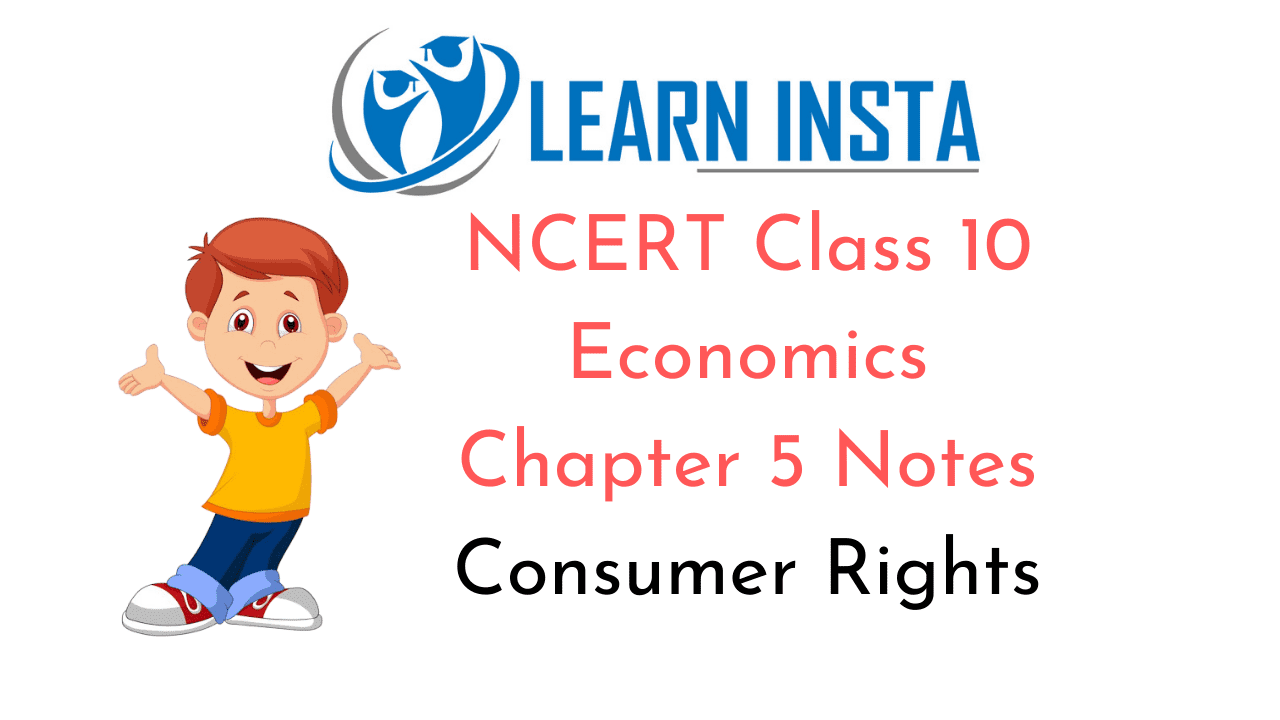 On this page, you will find NCERT Class 10 Economics Chapter 5 Notes Pdf free download. CBSE Class 10 Social Science Notes Economics Chapter 5 SST Consumer Rights will seemingly, help them to revise the important concepts in less time.
On this page, you will find NCERT Class 10 Economics Chapter 5 Notes Pdf free download. CBSE Class 10 Social Science Notes Economics Chapter 5 SST Consumer Rights will seemingly, help them to revise the important concepts in less time.
Consumer Rights Class 10 Notes Social Science Economics Chapter 5
CBSE Class 10 Economics Chapter 5 Notes Understanding the Lesson
1. People participate in the market both as producers and consumers. As producers of goods and services they could be working in any of the sectors. As consumers they participate in the market when they purchase goods and services that they need.
2. Rules and regulations are required for the protection of the consumers in the market place because markets do not work in a fair manner. Producers are few and powerful whereas consumers purchase in small amounts and are scattered. At times false information is passed on through the media, and other sources to attract consumers.
3. The consumer movement arose out of dissatisfaction of the consumers as many unfair practices were being indulged in by the sellers. There was no legal system available to consumers to protect them from exploitation in the market place.
4. In India, consumer movement originated slowly and steadily. Till the 1970s, consumer organizations were largely engaged in writing articles and holding exhibitions. They formed consumer groups to look into the malpractices in ration shops. Gradually, the number of consumer groups increased in the country.
5. The movement got success in creating pressure on business firms as well as government to correct business conduct. In 1986, the Indian government enacted the Consumer Protection Act, popularly known as COPRA.
6. As consumers, we have the right to be protected against the marketing of goods and delivery of services that are hazardous to life and property. Producers need to strictly follow the required safety rules and regulations because safety is everyone’s right.
7. Consumers have the right to be informed about the particulars of goods and services that they purchase. They can then complain and ask for compensation or replacement if the product proves to be defective in any manner.
8. In recent times, the consumers’ right to information has been expanded to cover various services provided by the Government. In October 2005, the Government of India enacted a law, known as Right to Information Act. The law ensures its citizens all the information about the functions of government departments.
9. Consumers have the right to choose whether to continue to receive the service. Consumers have also the right to seek redressal against unfair trade practices and exploitation. If any damage is done to a consumer, he/she has the right to get compensation depending on the degree of damage.
10. Consumer Forums or Consumer Protection Council guide consumers on how to file cases in the consumer court. On many occasions, they also represent individual consumers in the consumer courts.
11. Under COPRA, three-tier quasi-judicial machinery at the district, state and national levels was set up for redressal of consumer disputes. If a case is dismissed in district level court, the consumer can also appeal in state and then in national-level courts.
12. The Consumer Protection Act or COPRA has enabled consumers to have the right to represent in the consumer courts. The enactment of this Act has led to the setting up of separate departments of Consumer Affairs in central and state governments.
13. India has been observing 24 December as the National Consumer’s Day. India is one of the countries that have exclusive courts for consumer redressal.
14. The consumer redressal process is becoming difficult, expensive and time-consuming. The existing laws also are not very clear on the issue of compensation to consumers injured by defective products.
15. After more than 25 years of the enactment of COPRA, consumer awareness in India is spreading but slowly. It is rightly said that consumer movements can be effective only with the consumers’ active involvement.
Consumer Rights Class 10 CBSE Notes Important Terms
Consumer: A person who buys things or uses services.
Adulterated: Impure.
Producer: A person, company or country that makes or grows something.
Rampant: Existing or spreading everywhere in a way that is very difficult to control.
Compensation: Money that you pay to somebody because you have injured him/her or lost or damaged his/her property.
Redressal: Compensation for injuries sustained.
Cumbersome: Large or heavy and therefore, difficult to carry or use.
Enactment: The process of passing legislation.